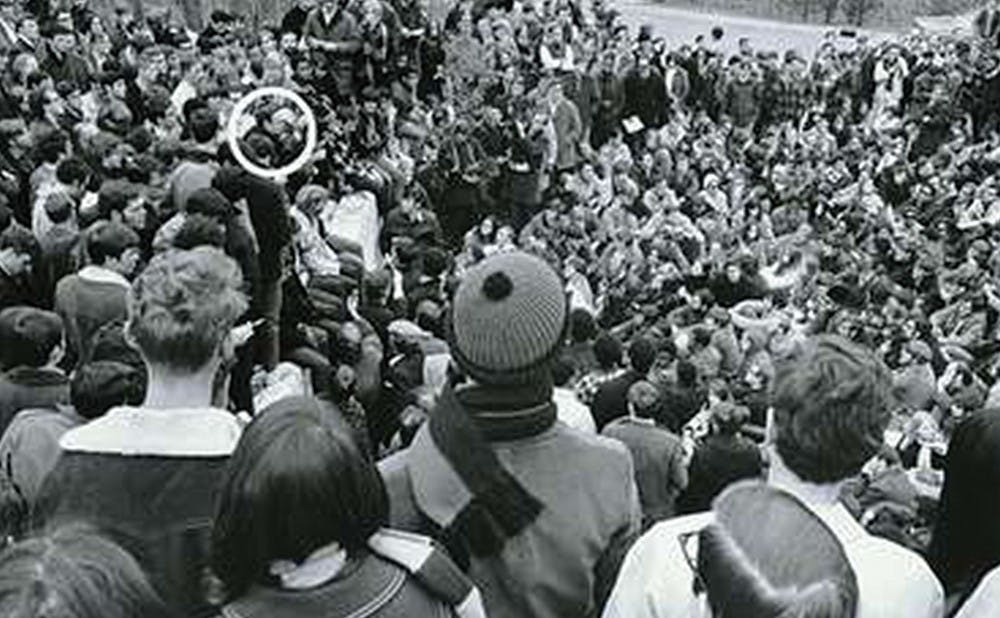Demands for greater inclusion on campus have persisted since the University's integration in 1963. The Chronicle has compiled a timeline of significant demands made to administration by students and faculty, including most recently the "Duke Tomorrow: Student-Organized Discussion with Brodhead and Administration" last Friday.
February 1969 — More than 50 black students took over the Allen building for eight hours and presented 13 demands to administrators, including creating an Afro-American Studies Department, increasing the enrollment of black students and ending harassment by campus police.
African American students made up 10 percent of all full-time undergraduate students in 2014, according to data from the Duke Office of News and Communications.
April 1988 — Black students protested the poor representation of black faculty at Duke and prompted the Academic Council to create the Black Faculty Initiative, which called for the University to add one black faculty member to each department.
As of May 2015, black faculty composed 4.4 percent of all Duke faculty, according to a report to the Academic Council by the Diversity Task Force.
May 1997 — Twenty black faculty members at Duke, later joined by 250 white faculty and staff, wrote a letter to then-president Nan Keohane calling for the University to take action in ending on-campus racism. The letter was prompted by the mistaken arrest of a black student by white Duke University Police Department officers in April and demanded that the punishment for those two officers be publicly revealed.
The officers—Paul Taylor and Carol Campbell—were suspended without pay after the student was mistakenly arrested.
November 1997 — Members of the Black Student Alliance held a three-hour study-in at the Allen Building to draw administrative attention to the original 1969 demands that they said had not been met and added two new ones—increasing the number of black faculty members and appointing a new director for the Mary Lou Williams Center for Black Culture, a position that had been open for two years.
Administrators appointed a new director for the Mary Lou Williams Center, Leon Dunkley, the following year.
March 2001 —Nan Keohane issued a report on the progress of the 13 demands. The report said that financial aid, funding for black student organizations and black faculty and student enrollment had increased, but that the demand for the creation of a black student dormitory was "deliberately side-stepped."
Other demands that had been fully met included appointing a full-time director to the Mary Lou Williams Center, giving the BSA permanent space in the Bryan Center and creating the Department of African and African-American Studies, according to the report.
April 2002 — Students proposed the creation of an Asian American Studies department.
Duke currently has an Asian and Middle Eastern Studies department. During the "Duke Tomorrow" forum last Friday, the Asian American Alliance called specifically for an Asian American Studies academic program in addition to the AMES program.
September 2003 — Seven student groups, including Mi Gente, submitted an opinion letter to The Chronicle following Sigma Chi fraternity’s “Viva Mexico” themed party. They demanded that administration address “the lack of minority faculty, the lack of support for minority students and the pervasive ignorance on campus."
May 2006 — 20 non-student members of the New Black Panther Party for Self Defense gathered on West Campus in response to the Duke lacrosse case. The NBPPSD members presented eight demands, including “an end to sexual abuse and rape,” legal action against the two indicted players and “an end to all hostile attacks and slander” against the alleged victim.
October 2011 — The Black Culture Living Group was approved by administrators, meeting the original demand for a black dormitory.
January 2012 — 20 BSA members presented concerns to Michael Schoenfeld, vice president for public affairs and government relations, at the Allen Building. The proposal asked for an endowment for cultural events, an explanation of the role of race in admissions, the creation of a group to assess the experience of black students and an expansion of the BSA Invitational—the admissions weekend for prospective black students.
In March 2012, the BSA secured $13,000 from the Office of the Provost for the BSAI weekend, as well as a promise that the administration would continue to maintain BSAI’s overall funding at the level of $20,000 annually.
March 2014 — A group called AccessDuke published a proposal for undocumented applicants to Duke to receive the same financial aid as domestic applicants and for undocumented students to have more resources available to them.
Representatives from Mi Gente called for access for undocumented students and Deferred Action for Childhood Arrivals recipients at the "Duke Tomorrow" forum.
Get The Chronicle straight to your inbox
Sign up for our weekly newsletter. Cancel at any time.
March 2015 — After a noose was found on the Bryan Center plaza, BSA published a list of “essential action items" including a pre-orientation program for black students, the publication of administrative incident reports about issues of race and discrimination and an orientation program to address issues of race, gender, sexual orientation, religion and class.
Starting this Fall semester, the University implemented a cultural sensitivity program titled "Building an Inclusive Campus Climate" into pre-orientation week.
November 2015 — After racist and homophobic events on campus, the University convened an open "community conversation" on November 13th. Many students expressed their discontent with the timing of the event and convened the "Duke Tomorrow: Student-Organized Discussion with Brodhead and Administration" on November 20th. During that discussion, students presented the "Demands of Black Voices" to administration.

